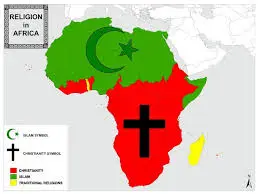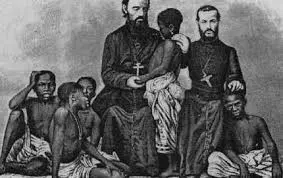Main Purpose Of Christianity On Africans
Introduction To Christianity In Africa
Main Purpose Of Christianity On Africans. Christianity has had a significant impact on the African continent, with its roots dating back to the early days of colonialism. The arrival of missionaries and European settlers brought with it the spread of Christianity, leading to the conversion of many Africans. The main purpose of Christianity in Africa was not only to spread the teachings of Jesus Christ, but also to assert control and influence over the native populations.
This resulted in a complex relationship between religion and colonization, as Christianity became intertwined with political power and social structures. Despite this complicated history, Christianity continues to thrive in Africa today, playing a vital role in shaping the cultural and spiritual landscape of the continent.
Spread Of Christianity In Africa

The spread of Christianity in Africa has been a significant aspect of the continent’s history. Missionaries from Europe and America have played a crucial role in introducing the Christian faith to Africans. The main purpose behind the spread of Christianity in Africa was to bring salvation and spiritual enlightenment to the indigenous people. Through education, healthcare, and social services provided by missionary organizations, Christianity has made a lasting impact on African societies.
Despite facing resistance from traditional religious beliefs and practices, Christianity continues to grow and thrive in many parts of Africa, shaping cultural norms and values among its followers.
Impact Of Christianity On African Societies
The impact of Christianity on African societies has been profound and multifaceted. With the introduction of Christianity, many African communities experienced significant changes in their social structures, cultural practices, and belief systems. Christianity brought about new forms of governance, education, healthcare, and social welfare programs to many African societies. It also played a role in shaping the moral values and ethical standards of these communities.
Additionally, the spread of Christianity led to the establishment of churches, schools, hospitals, and other institutions that have had a lasting impact on African societies. Overall, Christianity has had a transformative effect on various aspects of life in many African communities.
Main Purpose Of Christianity On Africans
The main purpose of Christianity on Africans was to spread the teachings of Jesus Christ and convert individuals to the Christian faith. Missionaries were sent to Africa with the goal of bringing salvation and eternal life to the indigenous populations through baptism and conversion. Christianity also aimed to instill moral values, promote education, and provide humanitarian aid to those in need.
By establishing churches, schools, and hospitals in African communities, Christianity sought to improve the overall well-being and spiritual growth of its followers. Ultimately, the main purpose of Christianity on Africans was to bring about spiritual transformation and create a sense of community among believers.
Challenges And Controversies Surrounding Christianity In Africa
One of the main challenges and controversies surrounding Christianity in Africa is the perception that it is a tool for Western colonization and cultural imperialism. Many Africans view Christianity as a foreign religion imposed on them by colonial powers, leading to tensions between traditional African beliefs and Christian teachings. Additionally, there are concerns about the role of Christian missionaries in promoting social inequality and economic exploitation in African communities.
Some critics argue that Christianity has been used to justify discrimination against marginalized groups, such as women and LGBTQ+ individuals. These controversies highlight the complex relationship between Christianity and African societies, raising important questions about power dynamics and cultural identity.
